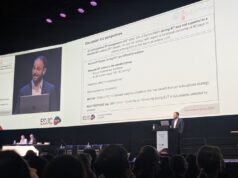
Serious disability is six times more likely to be the result three months after stroke among children whose large-vessel stroke was not treated with a mechanical thrombectomy procedure, according to preliminary late-breaking research presented the International Stroke Conference (ISC 2022; 9–11 February, New Orleans, USA).
An Australian study analysed severe strokes that occurred in a large artery or blood vessel in the brain in children. The treatment for these types of large-vessel clots in adults—according to an American Heart Association (AHA) press release—may involve mechanical removal of the clot via a thrombectomy.
Although mechanical thrombectomy is known to improve stroke recovery in adults, children have not been included in previous research, the release continues, and as such this study compared post-stroke disability between children who received the procedure and those who did not, to explore whether mechanical clot removal may be beneficial for children after severe stroke.
The study included 166 children (average age=six years old; 65% boys) treated for stroke at different hospitals throughout New South Wales in Australia from 2010 to 2019. Slightly less than one quarter of the children (n=39) had a blockage in a large blood vessel, or a severe stroke, which is similar to the rate found in adults. Thirteen children with this type of stroke received mechanical blood-clot removal, while 26 did not.
The 26 children who did not receive mechanical blood-clot removal had greater physical disability compared to the other two groups—the 13 children who did receive mechanical thrombectomy, and the 127 children whose stroke was not caused by a blockage in a large blood vessel. Specifically, researchers found:
- Children with a large blood vessel blockage who did not receive blood-clot removal were six times more likely to have moderate-to-severe disability after three months compared to those who received the procedure.
- Compared to children with an ischaemic stroke that was not in a large vessel, children with a large blood vessel blockage who did not receive mechanical thrombectomy were more than 3.5 times more likely to have significantly worse outcomes at three months after the stroke.
“We were surprised by how common large vessel blockage is in children with stroke and how much worse the disabilities were among the children who did not receive mechanical clot removal, compared to those who did,” said lead researcher Kartik Bhatia (Sydney Children’s Hospital Network, Westmead, Australia). “Now that we know how poor recovery is for these children who did not receive endovascular therapy, it is much easier to justify treatment options like clot removal for children with a large blood vessel stroke.”
In addition, the study found that about 80% of the children with a large vessel stroke met the Australian and US requirements—other than age—for adult eligibility for mechanical clot removal. “Our health systems also need improvement so children with severe stroke are able to receive mechanical clot removal more easily,” Bhatia added. “These children should be offered treatments to clear the blockages, just like we offer for adults.”
The study’s researchers note that it had several limitations that may have affected the results, including that it is a retrospective study relying on medical records to identify the levels of disability, and there was not a standard process of selection for treating patients.










